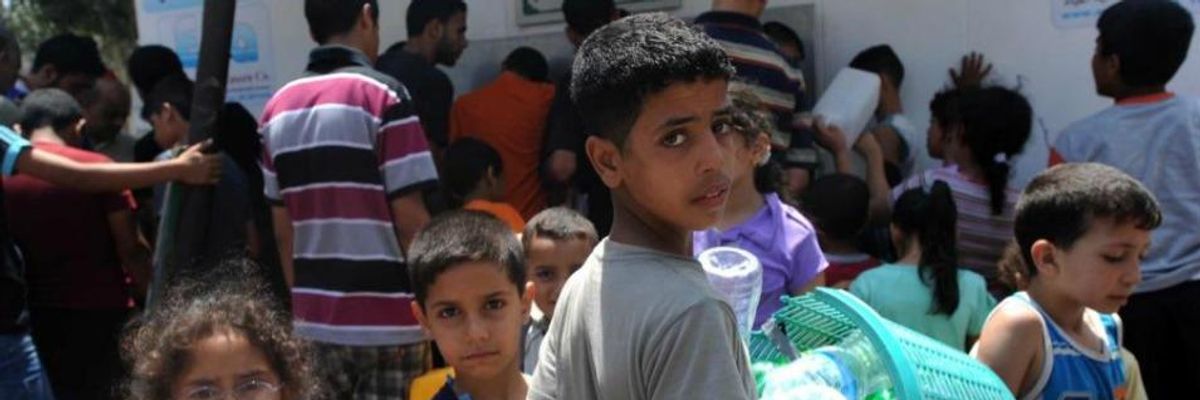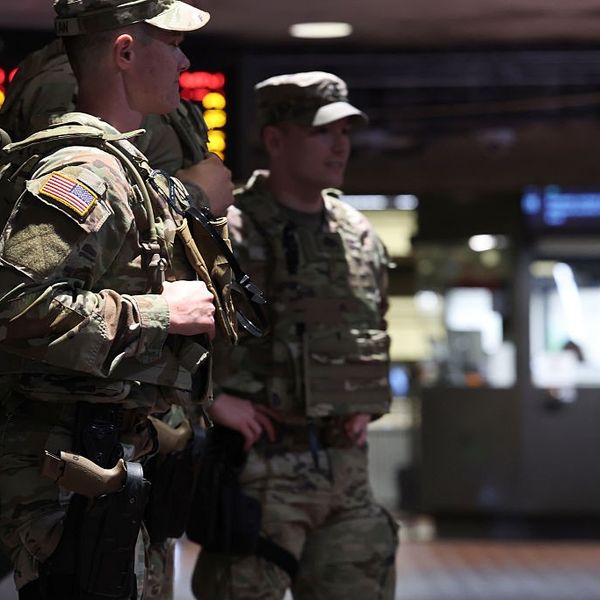
Households in Gaza are without water because there is no electricity for pumping. (Photo: UNRWA / Twitter)
As Attacks on Gaza's 'Besieged Civilians' Continue, US Gov't Rallies Behind Israel
Bombardments continued Friday night and Saturday, bringing the Palestinian death toll to at least 1,650—80 percent of them civilians.
Palestinian deaths continue to mount as Israel steps up its attacks on the besieged Gaza strip, following the crumbling of the short-lived "humanitarian ceasefire" on Friday.
Israel's heavy military attacks in and near Rafah continued Friday night, following earlier strikes on Rafah's main hospital. Heavy civilian casualties in the area are reported, and medical officials said Saturday at least a dozen homes were destroyed in the fresh round of attacks, according to Reuters. Israel bombed numerous other targets on Saturday, including the Islamic University and several mosques in Gaza City.
Ashraf al-Qudra, spokesperson for the Gaza Health Ministry, reported on Saturday that the Palestinian death toll is now at 1,650, with 8,900 wounded. Over 80 percent of Palestinians killed are civilians, according to UN estimates, and more than 300 of them are children. In Israel, 63 Israeli soldiers have died and three civilians have been killed over the past month.
United Nations Relief and Works Agency spokesperson Chris Gunness reported on Twitter Saturday:
UNRWA estimates that a quarter of Gaza's population is displaced. Disease is breaking out in UN shelters, which have been targeted by deadly airstrikes, in addition to Gaza's only power plant. This has led to electricity shortages throughout Gaza, cutting of households from basic services, including water.
Palestinian journalist Mohammed Omer reported Friday in Al Jazeera English that Israel is 'tightening the siege' on Gaza by declaring a buffer zone within Gaza's borders that "represents 44 percent of Gaza's territory." He writes, "To the east, Palestinians in Gaza are fenced in by Israeli artillery tanks, mortars, cannon shells and snipers. On Gaza's western side, Israeli warships form a blockade and allow only a three-mile fishing zone. To the north resides more military checkpoints and soldiers. To the south, the Egyptian military has closed off the Rafah border."
Both the United States and the United Nations blamed Hamas for breaking the 72-hour"humanitarian ceasefire" Friday by allegedly killing two Israeli soldiers and capturing one. "We have and I have unequivocally condemned Hamas and the Palestinian factions that were responsible for killing two Israeli soldiers and abducting a third," Obama said at a news conference on Friday.
But Max Blumenthal and Allison Deger write on Mondoweiss that there is insufficient evidence that Hamas alone is to blame. They argue that "the more likely explanation is that Washington has sought to frame Hamas as the aggressor to enable Israel to intensify military operations disproportionately directed against a besieged civilian population."
An Urgent Message From Our Co-Founder
Dear Common Dreams reader, The U.S. is on a fast track to authoritarianism like nothing I've ever seen. Meanwhile, corporate news outlets are utterly capitulating to Trump, twisting their coverage to avoid drawing his ire while lining up to stuff cash in his pockets. That's why I believe that Common Dreams is doing the best and most consequential reporting that we've ever done. Our small but mighty team is a progressive reporting powerhouse, covering the news every day that the corporate media never will. Our mission has always been simple: To inform. To inspire. And to ignite change for the common good. Now here's the key piece that I want all our readers to understand: None of this would be possible without your financial support. That's not just some fundraising cliche. It's the absolute and literal truth. We don't accept corporate advertising and never will. We don't have a paywall because we don't think people should be blocked from critical news based on their ability to pay. Everything we do is funded by the donations of readers like you. The final deadline for our crucial Summer Campaign fundraising drive is just days away, and we’re falling short of our must-hit goal. Will you donate now to help power the nonprofit, independent reporting of Common Dreams? Thank you for being a vital member of our community. Together, we can keep independent journalism alive when it’s needed most. - Craig Brown, Co-founder |
Palestinian deaths continue to mount as Israel steps up its attacks on the besieged Gaza strip, following the crumbling of the short-lived "humanitarian ceasefire" on Friday.
Israel's heavy military attacks in and near Rafah continued Friday night, following earlier strikes on Rafah's main hospital. Heavy civilian casualties in the area are reported, and medical officials said Saturday at least a dozen homes were destroyed in the fresh round of attacks, according to Reuters. Israel bombed numerous other targets on Saturday, including the Islamic University and several mosques in Gaza City.
Ashraf al-Qudra, spokesperson for the Gaza Health Ministry, reported on Saturday that the Palestinian death toll is now at 1,650, with 8,900 wounded. Over 80 percent of Palestinians killed are civilians, according to UN estimates, and more than 300 of them are children. In Israel, 63 Israeli soldiers have died and three civilians have been killed over the past month.
United Nations Relief and Works Agency spokesperson Chris Gunness reported on Twitter Saturday:
UNRWA estimates that a quarter of Gaza's population is displaced. Disease is breaking out in UN shelters, which have been targeted by deadly airstrikes, in addition to Gaza's only power plant. This has led to electricity shortages throughout Gaza, cutting of households from basic services, including water.
Palestinian journalist Mohammed Omer reported Friday in Al Jazeera English that Israel is 'tightening the siege' on Gaza by declaring a buffer zone within Gaza's borders that "represents 44 percent of Gaza's territory." He writes, "To the east, Palestinians in Gaza are fenced in by Israeli artillery tanks, mortars, cannon shells and snipers. On Gaza's western side, Israeli warships form a blockade and allow only a three-mile fishing zone. To the north resides more military checkpoints and soldiers. To the south, the Egyptian military has closed off the Rafah border."
Both the United States and the United Nations blamed Hamas for breaking the 72-hour"humanitarian ceasefire" Friday by allegedly killing two Israeli soldiers and capturing one. "We have and I have unequivocally condemned Hamas and the Palestinian factions that were responsible for killing two Israeli soldiers and abducting a third," Obama said at a news conference on Friday.
But Max Blumenthal and Allison Deger write on Mondoweiss that there is insufficient evidence that Hamas alone is to blame. They argue that "the more likely explanation is that Washington has sought to frame Hamas as the aggressor to enable Israel to intensify military operations disproportionately directed against a besieged civilian population."
Palestinian deaths continue to mount as Israel steps up its attacks on the besieged Gaza strip, following the crumbling of the short-lived "humanitarian ceasefire" on Friday.
Israel's heavy military attacks in and near Rafah continued Friday night, following earlier strikes on Rafah's main hospital. Heavy civilian casualties in the area are reported, and medical officials said Saturday at least a dozen homes were destroyed in the fresh round of attacks, according to Reuters. Israel bombed numerous other targets on Saturday, including the Islamic University and several mosques in Gaza City.
Ashraf al-Qudra, spokesperson for the Gaza Health Ministry, reported on Saturday that the Palestinian death toll is now at 1,650, with 8,900 wounded. Over 80 percent of Palestinians killed are civilians, according to UN estimates, and more than 300 of them are children. In Israel, 63 Israeli soldiers have died and three civilians have been killed over the past month.
United Nations Relief and Works Agency spokesperson Chris Gunness reported on Twitter Saturday:
UNRWA estimates that a quarter of Gaza's population is displaced. Disease is breaking out in UN shelters, which have been targeted by deadly airstrikes, in addition to Gaza's only power plant. This has led to electricity shortages throughout Gaza, cutting of households from basic services, including water.
Palestinian journalist Mohammed Omer reported Friday in Al Jazeera English that Israel is 'tightening the siege' on Gaza by declaring a buffer zone within Gaza's borders that "represents 44 percent of Gaza's territory." He writes, "To the east, Palestinians in Gaza are fenced in by Israeli artillery tanks, mortars, cannon shells and snipers. On Gaza's western side, Israeli warships form a blockade and allow only a three-mile fishing zone. To the north resides more military checkpoints and soldiers. To the south, the Egyptian military has closed off the Rafah border."
Both the United States and the United Nations blamed Hamas for breaking the 72-hour"humanitarian ceasefire" Friday by allegedly killing two Israeli soldiers and capturing one. "We have and I have unequivocally condemned Hamas and the Palestinian factions that were responsible for killing two Israeli soldiers and abducting a third," Obama said at a news conference on Friday.
But Max Blumenthal and Allison Deger write on Mondoweiss that there is insufficient evidence that Hamas alone is to blame. They argue that "the more likely explanation is that Washington has sought to frame Hamas as the aggressor to enable Israel to intensify military operations disproportionately directed against a besieged civilian population."

